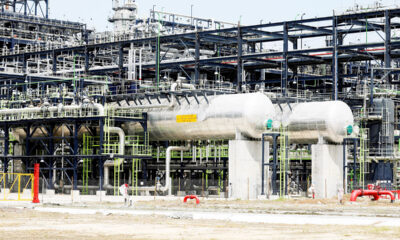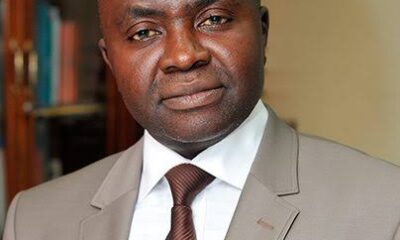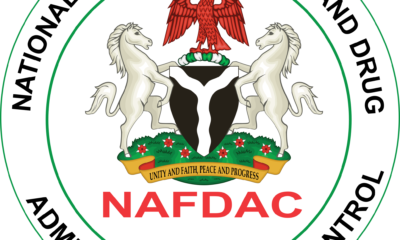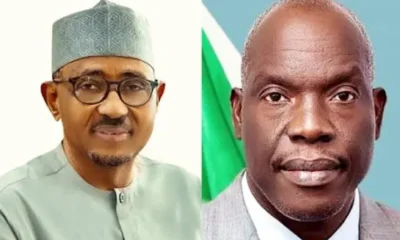Energy
How we ended Nigeria’s 50-Years fuel queue crises– Dangote Refinery
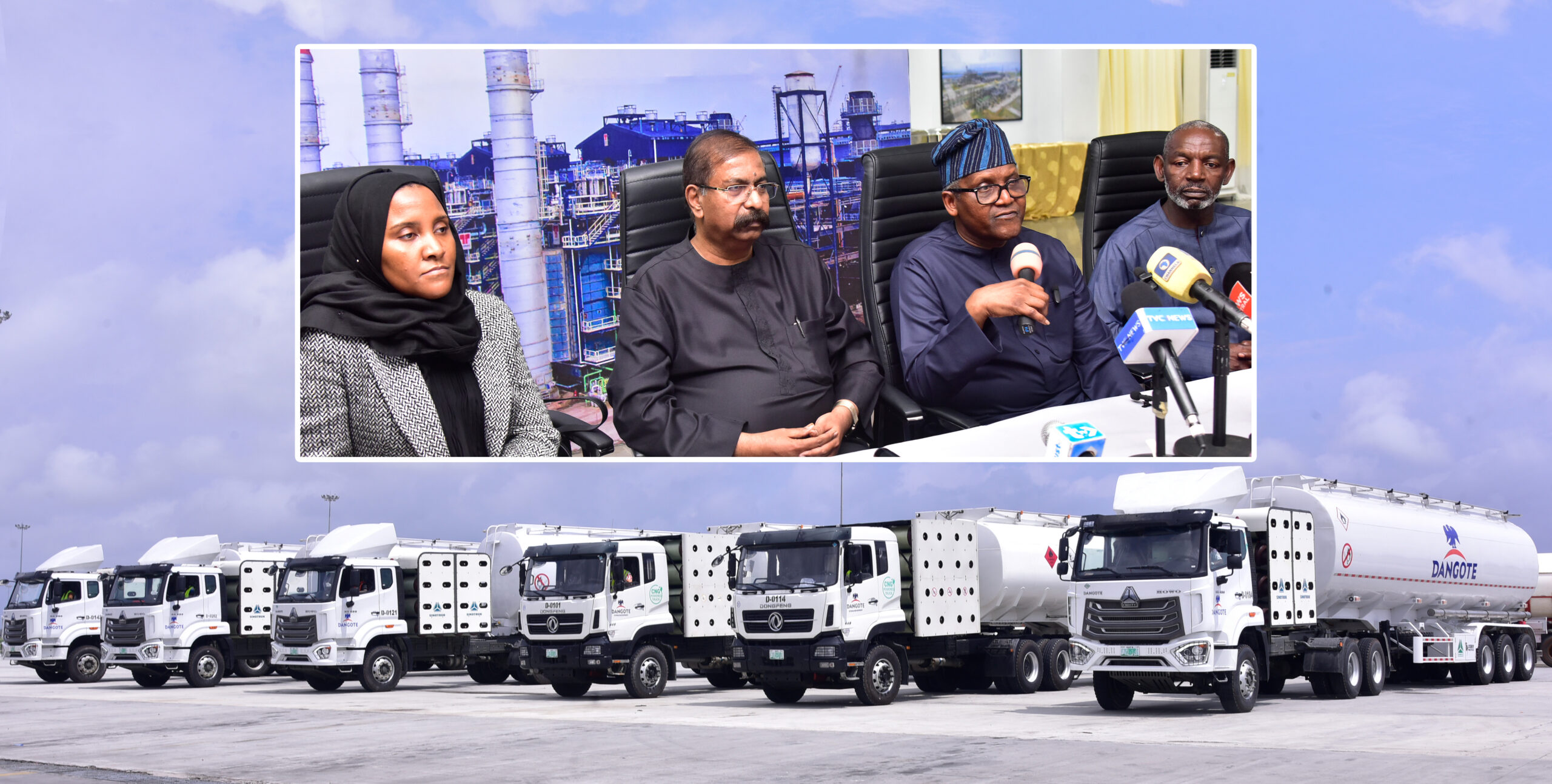
• We’re creating jobs, not displacing anyone
• Industrialisation, not importation will grow Africa’s economy
The President/Chief Executive, Dangote Petroleum Refinery, Aliko Dangote, has declared that since the refinery began producing petrol a year ago, Nigeria’s five-decade-long struggle with fuel queues has finally come to an end.
Speaking at a conference to mark the first anniversary of the launch of petrol from the 650,000 barrels-per-day refinery, Dangote highlighted that Nigerians have endured persistent fuel queues since 1975. However, this issue has been steadily resolved since the refinery began rolling out petrol on September 15, 2024.
“We have been battling fuel queues since 1975, but today Nigerians are witnessing a new era,” he said.
Acknowledging the numerous challenges the refinery has faced since its inception, Dangote emphasised the company’s unwavering commitment to Nigeria and Africa.
“The journey has been challenging because we sought to transform the downstream sector in Nigeria. Some believed we were taking food from their tables, which simply isn’t true. What we have done is to make our country and continent proud. Previously, only two African countries were not importing petrol, but regrettably, they have since resumed imports. This is detrimental to Africa,” he added.
Reflecting on the challenges faced during the refinery’s development, Dangote disclosed that the project involved enormous risk. He received repeated warnings from industry experts, investors, local and foreign government officials, who argued that only sovereign nations undertook such large-scale refinery ventures. He admitted that had the project failed, he would have lost all his assets to lenders.
“The decision to build the refinery was not easy. If it had gone wrong, lenders would have taken our assets. But we believed in Nigeria and Africa,” he said.
Despite opposition and economic headwinds, the refinery has successfully reduced the price of petrol from nearly N1,100 before production began to N841 in the South West, Abuja, Delta, Rivers, Edo, and Kwara. With the gradual rollout of CNG-powered trucks, Dangote anticipates this price reduction will soon be felt nationwide.
He noted that the refinery has sufficient capacity to meet Nigeria’s domestic demand while also generating foreign exchange through exports. He revealed that between June and first week of September 2025, the facility had exported over 1.1 billion litres of Premium Motor Spirit (PMS), underscoring its capacity to meet domestic demand and contribute significantly to foreign exchange earnings.
Emphasising job creation, he stated that the refinery has no intention of displacing workers but is instead generating thousands of new employment opportunities. The deployment of 4,000 CNG-powered trucks is expected to create at least 24,000 jobs across Nigeria.
“We have not displaced any jobs; we are creating many more. The CNG trucks will not be operated by robots,” he said. “Our employees earn salaries three times the minimum wage. Our drivers receive a living wage, life insurance, health insurance covering themselves, their spouses, and up to four children, as well as a lifelong pension. We are not only employing drivers but also mechanics, fleet managers, and other professionals to support the CNG fleet.”
Dangote clarified that while the company respects trade unions, membership is a personal choice for each driver.
He reaffirmed his commitment to Nigeria’s industrialisation, describing it as essential for the continent’s development. Dangote emphasised the urgent need for Nigeria to protect its local industries and discourage the dumping of cheap foreign goods, citing the collapse of the once-thriving textile sector as a cautionary example.
He noted that Nigeria’s path to sustainable economic growth lies in industrialisation, which not only boosts local productivity but also supports a circular economy.
“Other nations were not industrialised by outsiders. We must build and industrialise our own economies. Without this, how can others invest? That is why I believe the National Assembly should enact legislation to support the Federal Government’s ‘Nigeria First’ policy. My goal is to see Africa prosper, as we have the fastest-growing population in the world. Relying on imports means exporting jobs and importing poverty. Many individuals with greater financial resources than myself want to invest, but the challenges we face discourage them. Numerous sectors are still in urgent need of industrialisation,” he said
He reiterated that with the introduction of CNG trucks, the refinery can deliver products to consumers anywhere in Nigeria, mitigating all associated risks.
Dangote reiterated that the refinery remains open to partnerships and collaborations with other stakeholders in the downstream sector, stressing that the industry stands to gain more through collective effort and cooperation.
He also clarified that the refinery has no plans to enter the retail market, noting that he declined opportunities to acquire filling stations when they were offered for sale.
Looking ahead, Dangote announced that the refinery’s capacity would be expanded to 700,000 barrels per day in its second year of operation, with the aim of further supporting economic growth and job creation.
“Nigeria has now become the refining hub of Africa. We are set to become the largest exporter of polypropylene and are aiming to make Nigeria the world’s leading producer of fertiliser. These initiatives will generate substantial foreign exchange, create employment, and stimulate growth in other sectors,” he said.
“We are fully committed to supporting the government in adding value, creating jobs, and building a stronger economy.”
He also expressed his gratitude to the Federal Government, the refinery’s partners, dedicated workforce, and the Nigerian public for their continued support. In particular, he commended the Independent Petroleum Marketers Association of Nigeria (IPMAN) for encouraging its members to register for the free distribution initiative utilising CNG-powered trucks.
Dangote also used the occasion to showcase some of the CNG-powered trucks currently loading petrol from the refinery, emphasising that the company will successfully deploy all 4,000 trucks across the country soon. He allayed any fears of potential attacks on the drivers or the trucks, stressing that Nigeria is a country governed by the rule of law and that security agencies are fully empowered to protect its citizens and infrastructure.
Energy
NMDPRA’s Farouk Ahmed, NUPRC’s Komolafe resign
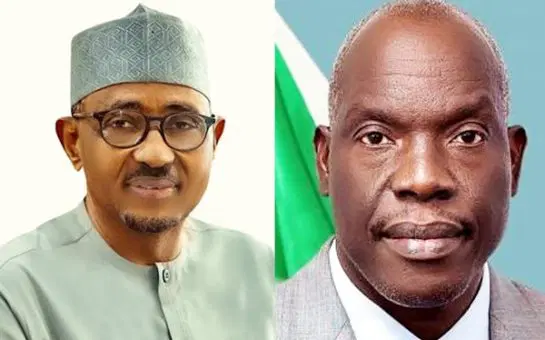
- President Tinubu nominates successors
THE embattled Chief Executive of the Nigerian Midstream and Downstream Petroleum Regulatory Authority NMDPRA Engr. Farouk Ahmed and his counterpart in the Nigerian Upstream Petroleum Regulatory Commission, NUPRC, Gbenga Komolafe, have resigned.
Already, President Bola Tinubu has asked the Senate to approve the nominations of two new chief executives for the NMDPRA and the NUPRC.
A statement by the presidential spokesman, Bayo Onanuga, explained that the President’s requests followed the resignation of the duo.
Both officials were appointed in 2021 by former President Buhari to lead the two regulatory agencies created by the Petroleum Industry Act (PIA).
To fill these positions, President Tinubu has written to the Senate, requesting expedited confirmation of Oritsemeyiwa Amanorisewo Eyesan as CEO of NUPRC and Engineer Saidu Aliyu Mohammed as CEO of NMDPRA.
The two nominees are seasoned professionals in the oil and gas industry.
Eyesan, a graduate of Economics from the University of Benin, spent nearly 33 years with the NNPC and its subsidiaries. She retired as Executive Vice President, Upstream (2023–2024), and previously served as Group General Manager, Corporate Planning and Strategy at NNPC from 2019 to 2023.
Engineer Saidu Aliyu Mohammed, born in 1957 in Gombe, graduated from Ahmadu Bello University in 1981 with a Bachelor’s in Chemical Engineering. He was announced today as an independent non-executive director at Seplat Energy.
His prior roles include Managing Director of Kaduna Refining and Petrochemical Company and Nigerian Gas Company, as well as Chair of the boards of West African Gas Pipeline Company, Nigeria LNG subsidiaries and NNPC Retail.
He also served as Group Executive Director/Chief Operating Officer, Gas & Power Directorate, where he provided strategic leadership for major gas projects and policy frameworks, including the Gas Masterplan, Gas Network Code, and contributions to the Petroleum Industry Act (PIA).
Engineer Mohammed played a pivotal role in delivering key projects such as the Escravos–Lagos Pipeline Expansion, the Ajaokuta–Kaduna–Kano (AKK) Gas Pipeline, and Nigeria LNG Train.

- Above advert placement contains allegations against the erstwhile NMDPRA Chief Executive, Farouk Ahmed
Recall that on Monday, the Dangote Refinery and Petrochemicals accused the NMDPRA led by Farouk Ahmed of undermining its refinery.
The President, Dangote Group, Aliko Dangote, also accused the regulating agency of economic sabotage and urged the government to probe its activities and also probe NMDPRA Chief Executive Officer (CEO), Farouk Ahmed.
He accused NMDPRA leadership of colluding with international traders and oil importers to frustrate local refining through the continued issuance of import licences for petroleum products.
Alleging that Ahmed had been living above his means, Dangote said the bills being picked by the NMDPRA boss raised serious questions about potential conflicts of interest and the integrity of regulatory oversight in the downstream petroleum sector.
Dangote said: “I am not calling for his removal, but for a proper investigation. He should be required to account for his actions and demonstrate that he has not compromised his position to the detriment of Nigerians. What is happening amounts to economic sabotage.”
The business mogul said: “The Code of Conduct Bureau (CCB), or any other body deemed appropriate by the government, can investigate him.
Energy
Dangote alleges sleaze in NMDPRA
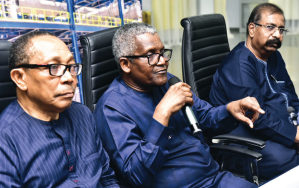
• Industrialist seeks probe of agency
• Petrol to sell for N740 from tomorrow
Dangote Refinery and Petrochemicals yesterday accused the regulating agency of downstream sector of undermining its refinery.
He accused Nigerian Midstream and Downstream Petroleum Regulatory Authority (NMDPRA) of economic sabotage and urged the government to probe its activities.
President of the Dangote Refinery, Alhaji Aliko Dangote, who spoke in Lagos yesterday at a news conference urged the government to also probe NMDPRA Chief Executive Officer (CEO), Farouk Ahmed.
He accused NMDPRA leadership of colluding with international traders and oil importers to frustrate local refining through the continued issuance of import licences for petroleum products.
Alleging that Ahmed had been living above his means, Dangote said the bills being picked by the NMDPRA boss raised serious questions about potential conflicts of interest and the integrity of regulatory oversight in the downstream petroleum sector.
He assured of further fall in the pump price of petrol. He said the product would sell at no more than N740 per litre from tomorrow in Lagos, because of his refinery’s reduction of gantry price to N699 per litre.
He said MRS filling stations would be the first to reflect the new pricing.
Expressing concern over the state of the downstream sector, Dangote said Nigeria’s continued reliance on fuel imports was harming local production and discouraging investment in domestic refining.
He said import licences covering approximately 7.5 billion litres of PMS had reportedly been issued for the first quarter of 2026, despite the availability of significant domestic refining capacity.
According to him, modular refineries are already struggling under the current policy environment and on the brink of extinction, while the persistent issuance of import permits further weakens the sector.
Dangote said: “I am not calling for his removal, but for a proper investigation. He should be required to account for his actions and demonstrate that he has not compromised his position to the detriment of Nigerians. What is happening amounts to economic sabotage.”
The business mogul said: “The Code of Conduct Bureau (CCB), or any other body deemed appropriate by the government, can investigate him.
He described the downstream petroleum sector as being under severe strain, alleging the presence of entrenched interests that profit from fuel imports at the expense of national development.
“There are powerful interests in the oil sector. It is troubling that African countries continue to import refined products despite long-standing calls for value addition and domestic refining. The volume of imports being allowed into the country is unethical and does a disservice to Nigeria,” he added.
Dangote stressed the need for a clear separation between regulatory oversight and commercial interests, warning that allowing traders to influence regulation would undermine the integrity of the sector.
“The downstream sector must not be destroyed by personal interests. A trader should never be a regulator. Forty-seven licences have been issued, yet no new refineries are being built because the environment is not conducive,” he said.
He maintained that Nigerians would ultimately benefit from local refining, fuel importers incur losses. Dangote said he would not relent in ensuring that Nigerians enjoy the benefits of domestic refining, noting that the company was working around the clock to ensure that recent reductions in the gantry price were fully reflected at the retail level.
“From Tuesday (tomorrow)”, he said, “all MRS filling stations would begin selling PMS at prices not exceeding N740 per litre, starting in Lagos.”
He added that the refinery had reduced its minimum purchase requirement from two million litres to 500,000 litres to enable more marketers, including members of the Independent Petroleum Marketers Association of Nigeria (IPMAN), to participate.
“So, if you come to the refinery today, you will get PMS at N699 per litre,” he said.
Dangote explained that despite frustration and sabotage, the refinery would deploy its Compressed Natural Gas (CNG) trucks in the coming days and was prepared to procure additional units beyond the initial 4,000 if required to sustain affordable pricing nationwide.
Responding to complaints from oil importers that the recent price reduction would result in losses, Dangote said the refinery was established primarily for the benefit of Nigerians.
“Anyone who chooses to continue importing despite the availability of locally refined products should be prepared to face the consequences,” he said.
He also highlighted quality differences, noting that products supplied through MRS and other off-takers from the refinery were straight-run fuels, unlike blended products imported from overseas markets.
“Nigerians have a choice to buy better quality fuel at a more affordable price or to buy blended PMS at a higher rate. Importers can continue to lose, so long as Nigerians benefit,” he added.
Dangote said the refinery was driven more by legacy than profit, noting that he could have invested the 20 billion dollars elsewhere if financial gain were his sole objective.
He reaffirmed the plan to list the refinery on the Nigerian Exchange to allow Nigerians to own shares in the facility.
“We want every living Nigerian to have the opportunity to benefit, no matter how small their holding. If the market takes 55 per cent and I retain 45 per cent, I am satisfied,” he said.
Dangote explained that discussions were ongoing with the Securities and Exchange Commission (SEC) to enable Nigerians to purchase shares in naira while receiving dividends in dollars.
Dangote accused the NMDPRA of misrepresenting the refinery’s capacity by publishing off-take figures rather than actual production levels.
“We have the capacity to meet local demand, and we have sufficient refined products in stock. But to keep prices high, imports are deliberately encouraged,” he said, adding that attempts were being made to push the refinery into exporting products only for them to be re-imported into Nigeria at higher prices.
“This refinery is for Nigerians first, and I am not giving up,” he said.
Dangote also explained that the refinery imports an average of 100 million barrels of crude oil annually from the United States, a figure expected to rise to 200 million barrels following expansion, due to insufficient domestic crude supply.
He added that the refinery also sources crude from Ghana and other countries, while exporting jet fuel and gasoline to the United States (U.S.).
Dangote further alleged that domestic refiners are forced to buy Nigerian crude at premiums of up to four dollars per barrel from the trading arms of international oil companies, placing them at a competitive disadvantage.
He called on the government to ensure crude oil taxes are assessed based on actual transaction values, warning that the current system allows under-declaration and revenue losses.
Energy
NNPC E&P Limited Hits Record 355,000 bpd Production
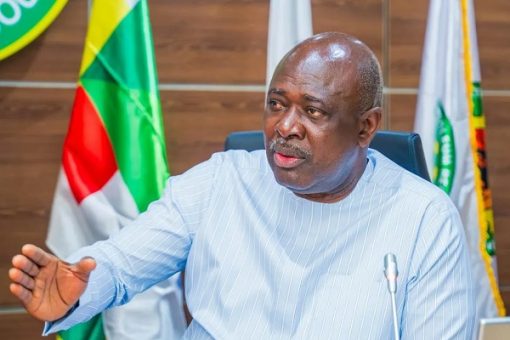
• Nigeria’s Energy Revival Already Happening, Says Ojulari
On December 1st, 2025, NNPC E&P Limited (NEPL), the flagship upstream subsidiary of NNPC Limited, achieved a record production level of 355,000 barrels of oil per day, its highest daily output since 1989.
The milestone marks a significant step forward for Nigeria’s upstream sector and reflects the company’s ongoing transformation anchored on efficiency and discipline.
The figures show genuine transformation: average daily production surged 52%, rising from 203,000 barrels per day in 2023 to 312,000 in 2025.
This growth is no coincidence; it stems from a clear strategy anchored on operational excellence, strong asset management, and structured field development. NEPL’s performance demonstrates that with the right leadership, strengthened systems, and a committed workforce, Nigeria’s upstream sector can overcome years of instability.
The achievement converts national ambition into measurable momentum. The presidential targets of 2 million barrels per day by 2027 and 3 million by 2030 have often appeared aspirational. NEPL’s delivery brings them closer to reality.
Speaking on the development, Engr. Bashir Bayo Ojulari, the Group CEO of NNPC Limited pointed out that the milestone is proof that Nigeria’s energy revival is not a dream; it is already happening.
“By showing its ability to exceed its own production benchmarks, NEPL confirms that the essential building blocks for scaling national output are being firmly established. The achievement signals that the machinery of production—equipment, processes, capabilities, and partnerships—can be driven with commercial discipline to produce real and positive outcomes,” Ojulari stated.
He noted that the achievement reinforces confidence nationally and across the global energy landscape, assuring partners and investors that Nigeria is committed to reaffirming its role as a dependable energy supplier.
Also speaking, Udy Ntia, the Executive Vice President, Upstream, observed that the milestone goes beyond the 355,000 bpd figure.
“In a sector where shortcuts can yield short-term wins but long-term damage, NEPL is making a different point: sustainable progress must rest on responsible operations. This ensures that scaling production does not compromise worker safety, community wellbeing, or environmental protection. It reinforces a shift away from extraction at any cost towards sustainable value creation—a core requirement for any modern energy company seeking global relevance,” Ntia added.
Nicolas Foucart, MD, NEPL also noted that NEPL’s record-setting performance mirrors the broader transformation unfolding across NNPC Limited.
“This is a story shaped by leadership that charts a clear course; by partnerships built on alignment and accountability; and by a workforce whose hard work is turning goals into measurable progress. Our people, our processes, and principles are the real engines behind this success. We are building for tomorrow, not just celebrating today,” Foucart stated.
He added: “For Nigerians, this accomplishment means far more than increased barrels; it translates into greater national revenue, stronger energy security, and a more resilient economic foundation. NEPL has not only produced more hydrocarbons; it has reignited belief in what Nigeria’s energy sector can achieve with the right systems, culture, and dedication.”
NNPC E&P Limited is a wholly-owned subsidiary of the Nigerian National Petroleum Company (NNPC) Limited involved in the exploration and production of oil and gas resources.
-

 Art & Life9 years ago
Art & Life9 years agoThese ’90s fashion trends are making a comeback in 2017
-

 Entertainment8 years ago
Entertainment8 years agoThe final 6 ‘Game of Thrones’ episodes might feel like a full season
-

 Art & Life9 years ago
Art & Life9 years agoAccording to Dior Couture, this taboo fashion accessory is back
-

 Business9 years ago
Business9 years agoThe 9 worst mistakes you can ever make at work
-

 Entertainment9 years ago
Entertainment9 years agoThe old and New Edition cast comes together to perform
-

 Sports9 years ago
Sports9 years agoPhillies’ Aaron Altherr makes mind-boggling barehanded play
-

 Entertainment9 years ago
Entertainment9 years agoMod turns ‘Counter-Strike’ into a ‘Tekken’ clone with fighting chickens
-

 Entertainment9 years ago
Entertainment9 years agoDisney’s live-action Aladdin finally finds its stars


